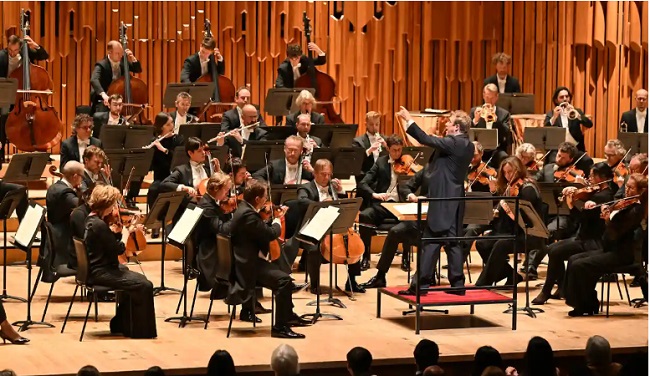 Switzerland Brahms, Beethoven: Leonidas Kavakos (violin), Royal Concertgebouw Orchestra / Daniel Harding (conductor). Tonhalle, Zurich, 15.11.2022. (JR)
Switzerland Brahms, Beethoven: Leonidas Kavakos (violin), Royal Concertgebouw Orchestra / Daniel Harding (conductor). Tonhalle, Zurich, 15.11.2022. (JR)

Brahms – Violin Concerto Op.77
Beethoven – Symphony No.6 ‘Pastoral’ Op.68
The Royal Concertgebouw Orchestra are coming to the end of a brief European tour with this concert, which they performed in London a short while ago. A very regulation programme clearly designed not only to fill the concert hall (it was indeed full to the last seat and encouragingly with many youngsters, including music students) but also to show off the renowned warmth of the RCO’s orchestral sound. It was paired in London, on another evening, with Mahler’s Ninth Symphony, but we were deprived of that particular pleasure on this whistle-stop tour round Swiss cities, kindly sponsored by Migros Kulturprozent Classics.
The Brahms Violin Concerto has many technical difficulties, double-stops, compound chords and wide leaps; Greek violinist Leonidas Kavakos is no stranger to this work, and masters the hurdles with ease. Kavakos also has complete command of the structure of the work, moulding each phrase with care. He turns to the Leader of the first violins to co-ordinate entries and keeps a firm eye on the conductor when needed. This was an exemplary performance; I cannot imagine a finer one. It was muscular and virile; the thrilling first movement was utterly mesmerising. The long cadenza and the tender slow movement had the audience spellbound. Daniel Harding accompanied with grace and sensitivity, but all eyes and ears were on the soloist. The furious finale had Kavakos attacking his instrument with gusto, occasionally at the cost of some intonation, but always bounding along with joyful abandon. It was hugely enjoyable and was met with the loudest applause I have heard at the Tonhalle for a long while. We were rewarded by a lengthy extract from Bach’s Sonata No.3; Kavakos has described Bach’s music as the finest music ever written.
The Beethoven which followed made us concentrate on the orchestra. Harding placed the players antiphonally, with the second violins to his right, the cellos centre and the five double basses lined up along the back. The result is a homogenous string sound, with particular prominence given aurally and visually to the hard-working double basses. Strings are mellow rather than transparent, and beautifully blended. Characterful woodwind soloists stood out; I mention just one, Russian oboist Alexei Ogrintchouk. His only weakness is to ostentatiously lift his bell rather too often.
The slow movement stood out for the gossamer quality of the string playing, particularly by the second violins. The principal clarinet, flute and oboe continued to astound with their technique and sublime sound. The orchestra made us listen afresh to this work, so familiar to so many but surprisingly rare in concert nowadays, when many hanker for a ‘heavier’ symphony in the second half of concerts.
The storm interlude was most impressive, with the timpanist changing to hard sticks. This was playing of the highest order, cementing the RCO’s position as undoubtedly one of the world’s finest orchestras. Daniel Harding clearly has an excellent rapport with the orchestra. Harding’s attention to detail, his command of the dynamics and his phrasing were all admirable.
The orchestra is in a long interregnum period, as they wait for their new Finnish Principal Conductor Klaus Mäkelä to commence his reign in 2027. Harding is clearly (and rightly) a favourite of theirs in the meantime.
During the interval, the Swiss Friends of the Concertgebouw Orchestra held a reception in the Foyer; this performance should have added to their number of members.
John Rhodes
